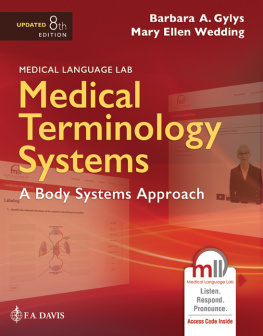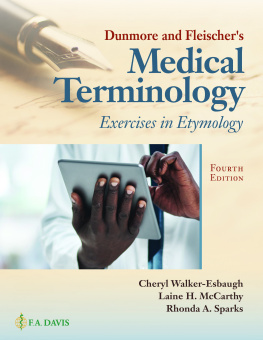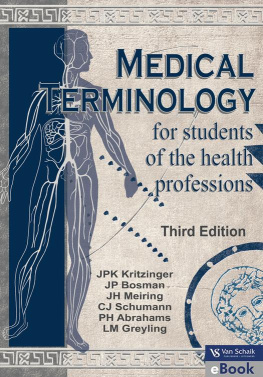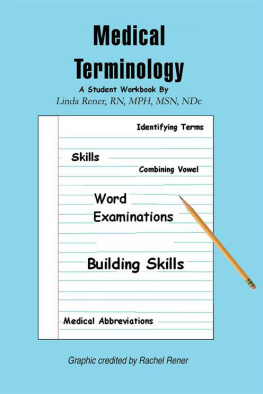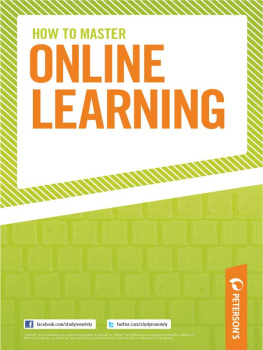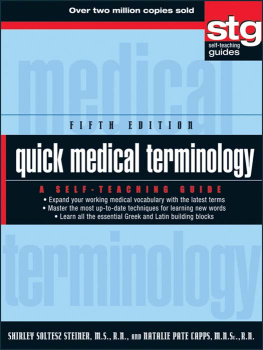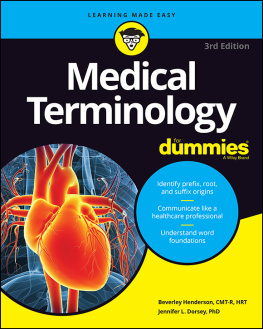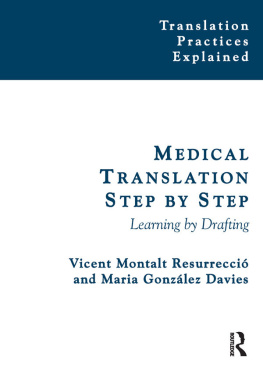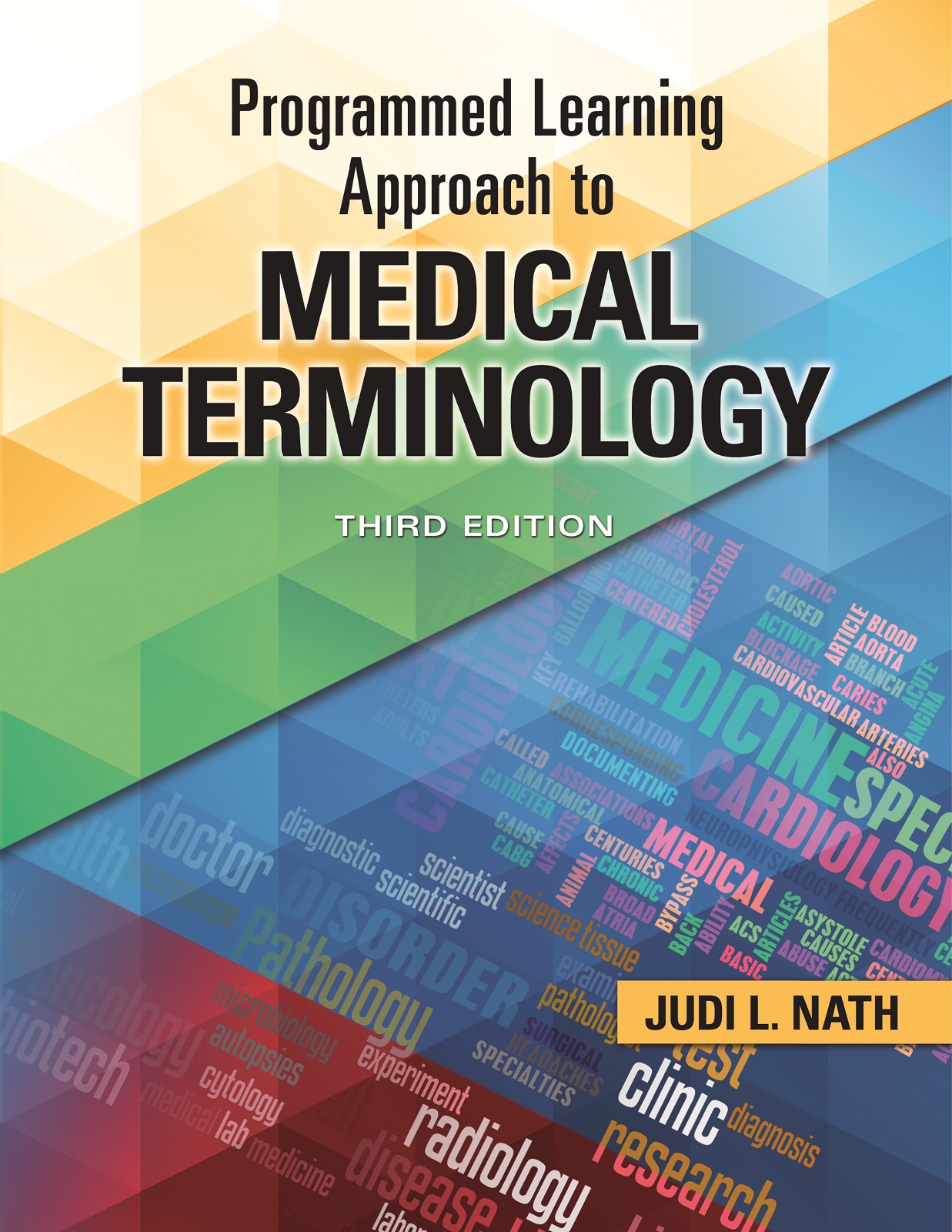
Programmed Learning
Approach to
MEDICAL
TERMINOLOGY
THIRD EDITION
Judi L. Nath, Ph.D.
Professor
Biology & Health Sciences
Lourdes University
Sylvania, Ohio


World Headquarters
Jones & Bartlett Learning
5 Wall Street
Burlington, MA 01803
978-443-5000
www.jblearning.com
Jones & Bartlett Learning books and products are available through most bookstores and online booksellers. To contact Jones & Bartlett Learning directly, call 800-832-0034, fax 978-443-8000, or visit our website, www.jblearning.com.
Substantial discounts on bulk quantities of Jones & Bartlett Learning publications are available to corporations, professional associations, and other qualified organizations. For details and specific discount information, contact the special sales department at Jones & Bartlett Learning via the above contact information or send an email to .
Copyright 2019 by Jones & Bartlett Learning, LLC, an Ascend Learning Company
All rights reserved. No part of the material protected by this copyright may be reproduced or utilized in any form, electronic or mechanical, including photocopying, recording, or by any information storage and retrieval system, without written permission from the copyright owner.
The content, statements, views, and opinions herein are the sole expression of the respective authors and not that of Jones & Bartlett Learning, LLC. Reference herein to any specific commercial product, process, or service by trade name, trademark, manufacturer, or otherwise does not constitute or imply its endorsement or recommendation by Jones & Bartlett Learning, LLC and such reference shall not be used for advertising or product endorsement purposes. All trademarks displayed are the trademarks of the parties noted herein. Programmed Learning Approach to Medical Terminology, Third Edition is an independent publication and has not been authorized, sponsored, or otherwise approved by the owners of the trademarks or service marks referenced in this product.
There may be images in this book that feature models; these models do not necessarily endorse, represent, or participate in the activities represented in the images. Any screenshots in this product are for educational and instructive purposes only. Any individuals and scenarios featured in the case studies throughout this product may be real or fictitious but are used for instructional purposes only.
This publication is designed to provide accurate and authoritative information in regard to the Subject Matter covered. It is sold with the understanding that the publisher is not engaged in rendering legal, accounting, or other professional service. If legal advice or other expert assistance is required, the service of a competent professional person should be sought.
20913-6
Production Credits
VP, Product Management: Amanda Martin
Director of Product Management: Cathy L. Esperti
Product Specialist: Ashley Malone
Product Coordinator: Elena Sorrentino
Digital Project Specialist: Angela Dooley
Director of Marketing: Andrea DeFronzo
Marketing Manager: Suzy Balk
Production Services Manager: Colleen Lamy
VP, Manufacturing and Inventory Control: Therese Connell
Product Fulfillment Manager: Wendy Kilborn
Composition: S4Carlisle Publishing Services
Project Management: S4Carlisle Publishing Services
Cover & Text Design: Scott Moden
Senior Media Development Editor: Troy Liston
Rights Specialist: Rebecca Damon
Printing and Binding: LSC Communications
Library of Congress Cataloging-in-Publication Data
Library of Congress Cataloging-in-Publication Data unavailable at time of printing.
LCCN: 2020933371
6048
Printed in the United States of America
24 23 22 21 20 10 9 8 7 6 5 4 3 2 1
To Mike, Gabbi, and Quincy,
who have been with me throughout every day and every page
Preface to the Student
SUMMARY OF TEXTBOOK OBJECTIVES
Upon completion of this text, you will be able to:
Describe the origin of medical terminology.
Analyze the parts of medical terms and use basic prefixes, suffixes, roots, and combining forms to build medical terms.
Explain common rules for the proper formation, pronunciation, and spelling of medical terms.
Identify common pharmaceutical terms and abbreviations used in documenting medical records.
Identify common anatomical terms related to the major body systems.
Identify common terms related to signs, symptoms, diagnoses, surgeries, therapies, and diagnostic tests related to the major body systems.
Explain common terms and abbreviations used in documenting medical records related to the major body systems.
GETTING STARTED
Study Tips
To reach the goal of learning medical terminology, youll need a reasonable plan for completion. Follow the study path that this text and/or your instructor provides, and work the necessary study time into your personal schedule.
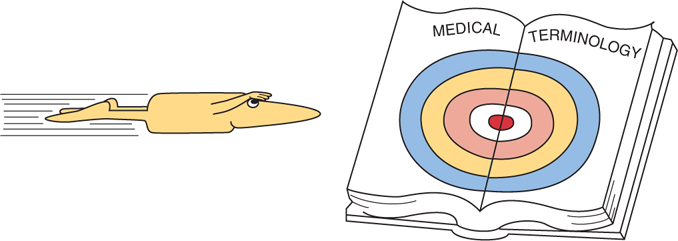
An effective memory depends on intricate processes that recall mental images of sights, sounds, feelings, tastes, and smells. For this reason, try to include as many senses as possible in the process of reinforcing learning. My students use the see it, hear it, say it, read it, write it, learn it approach for learning material.
SEE IT | Employ your visual sense (sight) by making and repeatedly reviewing any flash cards or notes you take. |
HEAR IT | Listen to your instructor as the terms are pronounced. |
SAY IT | Pronounce word parts and terms out loud to reinforce your auditory sense (hearing). |
READ IT | Read your textbook carefully and re-read sections until you feel comfortable that you know the material. |
WRITE IT | Write and rewrite responses to programmed review sections before highlighting the correct answers. Make flash cards by hand using pleasant colored paper and ink to satisfy your kinesthetic sense (feeling). |
LEARN IT | Study at different times of the day and in different places, making sure that you take frequent breaks. Marathon study sessions are counterproductive. Remember that your goal is life-long learning, not just learning for a test. |
Mnemonics Can Help
Mnemonics refer to letter patterns, ideas, or associations that help you remember something. The term is derived from the word Mnemosyne, the name of the Greek mythological goddess of memory. Mnemonic techniques link terms you want to remember with some other stimulus such as an image, a sound, or a smell. Consider the following applications:
Next page

